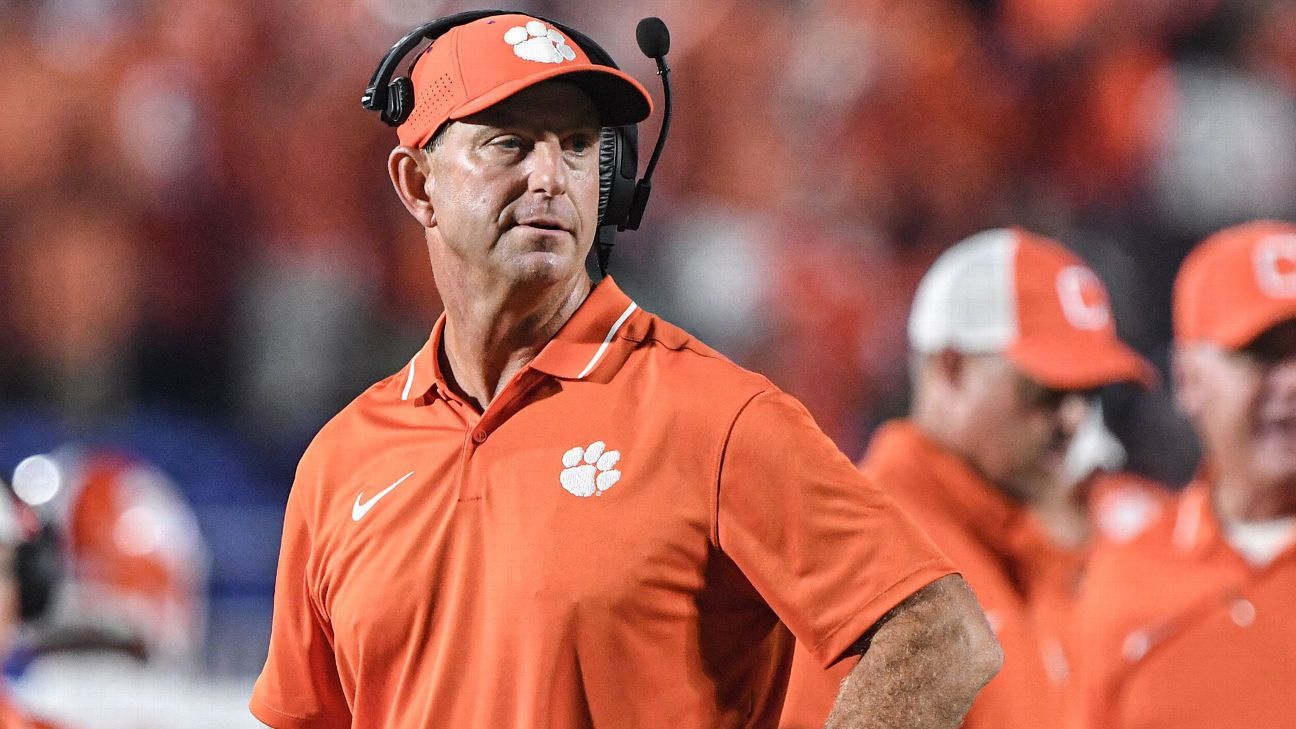CHARLOTTE, N.C. — College football might soon say goodbye to walk-on players, and Clemson head coach Dabo Swinney, a former walk-on player at Alabama, said it will be a huge loss for the sport.
As part of the settlement in the House vs. NCAA case, schools can no longer be limited in the number of scholarships they offer, though roster sizes can still be capped. Administrators were quick to push for a lower cap — likely between 105 and 110 players, according to multiple sources — in order to reduce expenses that would come with a huge jump in scholarships.
The result will be that many current walk-ons will be forced from participating on their current teams, causing an uproar among coaches.
“This is the most united coaches have been in the history of football,” Swinney said. “It’s so frustrating.”
Swinney began his career as a walk-on receiver at Alabama, earning a scholarship after two years on scout team. That experience, he said, led him to a job as a graduate assistant and, eventually, a receivers coach for Gene Stallings and, ultimately, a two-time national championship winning head coach at Clemson. Had he not been able to walk on to Alabama’s team as a freshman, however, none of that would’ve happened.
“That doesn’t happen if [Stallings] hadn’t seen me,” Swinney said. “I can’t even imagine how different things would’ve been.”
North Carolina head coach Mack Brown said the son of passing game coordinator Lonnie Galloway, the son of a trustee, and sons of several former Tar Heels players are all among the walk-ons in Chapel Hill, and if the situation isn’t addressed, he’ll have to cut all of them loose.
“I have to tell them in January they can’t play football anymore. That’s the hardest thing for kids. The money’s crazy, but we’ll deal with all that. But telling a kid that’s been on your team and done everything right that you can’t play football anymore?”
Swinney said internally Clemson has brainstormed potential work-arounds, including a grandfather clause that would allow current walk-ons to remain with their teams until graduation or even starting club football teams who would practice with the scholarship players but play games against club teams from other schools.
“We’ve been trying to figure out how to attack it from lots of angles,” Swinney said.
Clemson, in particular, has a rich history of success with walk-ons, including Phillip Price, a starting left tackle on the Tigers’ 2009 ACC championship team, and Hunter Renfrow, a former walk-on who caught the game-winning touchdown in Clemson’s 2016 national championship and now plays in the NFL.
Swinney pointed to the Burlsworth Trophy, which is given annually to the nation’s top former walk-on, as an example of just how many players arrive without a scholarship but depart as stars.
“We’ve had great success with walk-ons,” said Cal coach Justin Wilcox. “There are two guys that are playing in the NFL right now that were walk-ons. I don’t want to lose that.”
Some top walk-ons would likely earn scholarships when the limit is increased, but many others would likely opt to head to lower levels in order to keep playing.
On the flip side, if each school adds 20 or more scholarships to go from the current limit of 85 to the proposed 105 or more, that would open upwards of 1,300 scholarships at the Power Four level all at once, likely inducing a groundswell of transfers from Group of Five and FCS programs.
The transfers are unlikely to stop there, however. Swinney noted that most teams only travel 80 players for road games, meaning 25 or more scholarship players will be left behind. That, he said, will almost certainly lead to frustration and ever more players entering the portal at year’s end.
The larger number of scholarships, however, still represents a reduction in overall roster size. Most Power Four teams will enter this season with at least 120 players rostered — a necessity, Swinney said, to practice efficiently and to address attrition over the course of a season.
Swinney pointed to Florida State‘s appearance in the 2023 Orange Bowl when 20 regulars missed the game due to opt-outs or transfer.
“Mike Norvell would’ve had to forfeit the Orange Bowl without walk-ons,” he said. “It’s going to be a problem. There’s going to be some bowl games not played.”
